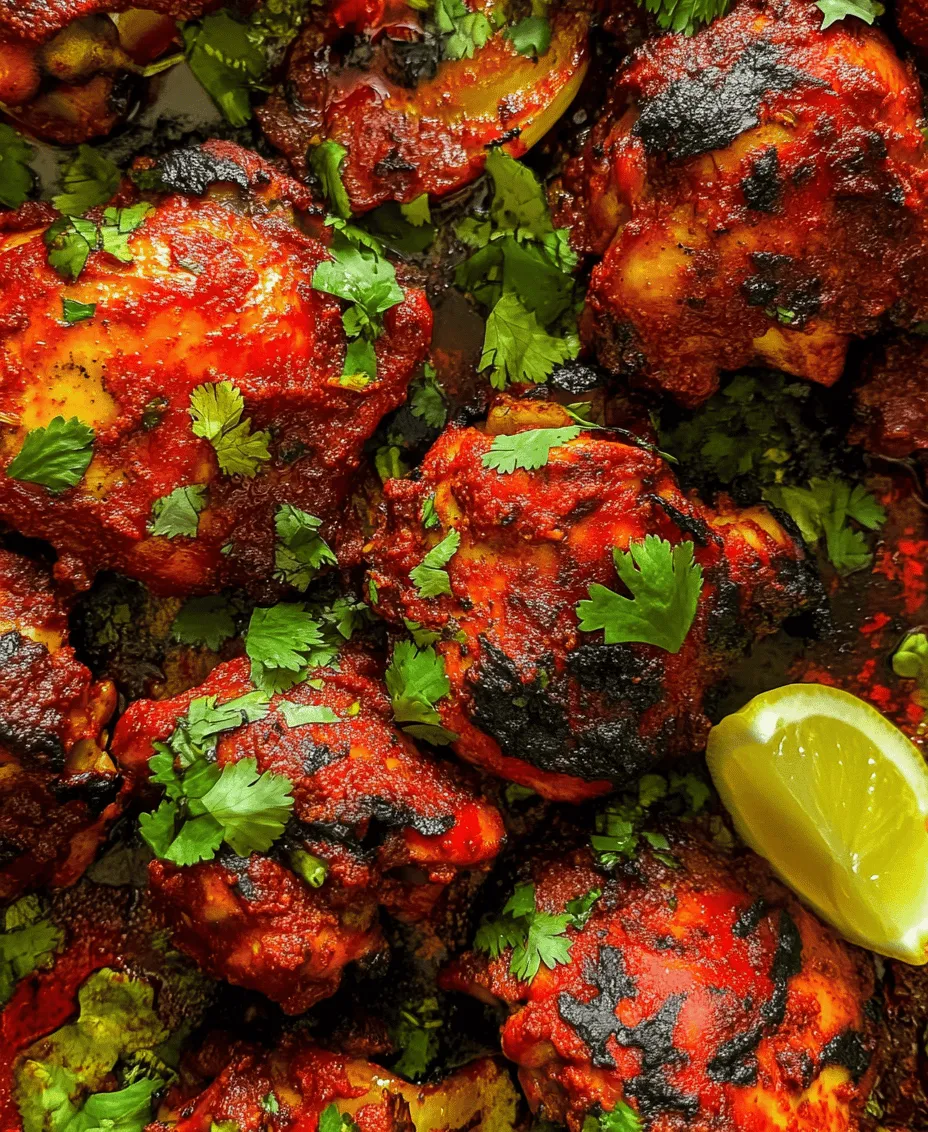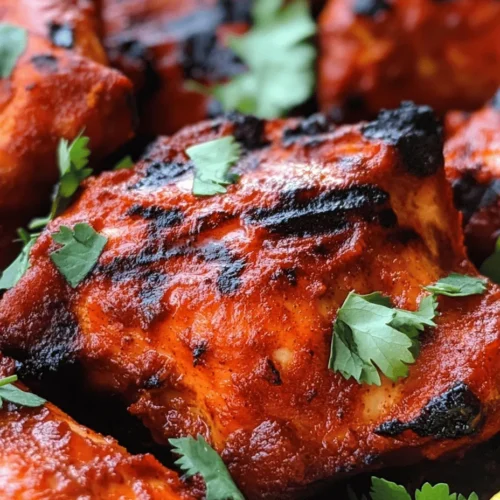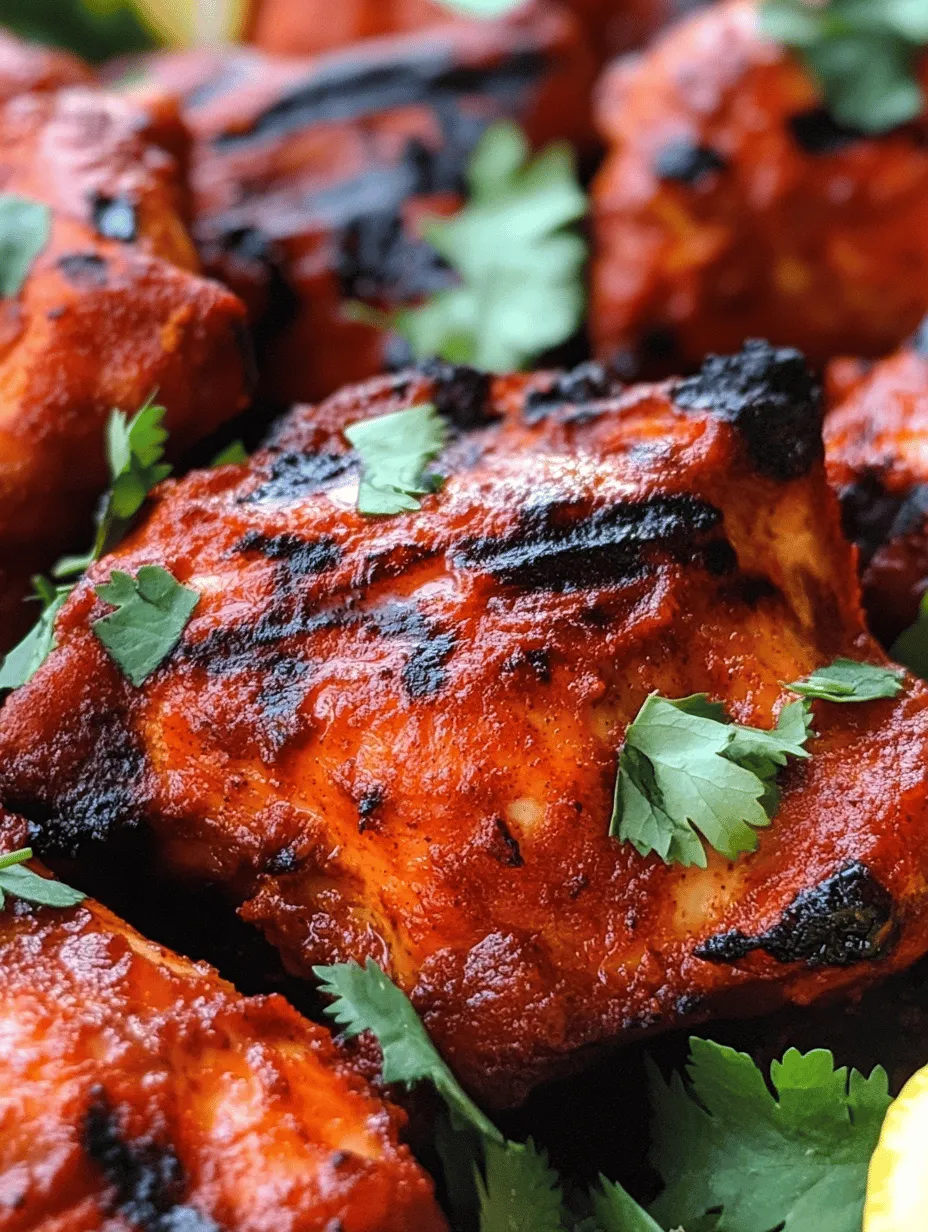Introduction
Tandoori chicken is a beloved dish that holds a special place in Indian cuisine. Its vibrant colors, aromatic spices, and smoky flavor have made it a favorite not only in India but around the globe. Traditionally cooked in a clay oven known as a tandoor, this dish has transitioned beautifully into home kitchens, especially with the advent of grilling methods that replicate the smoky, charred goodness of authentic tandoori cooking.
Grilled Tandoori Chicken is an appealing option for home cooks looking for a healthy meal packed with flavor. The grilling process allows the chicken to retain its moisture while developing a tantalizing crust from the marinade. With a unique blend of spices and yogurt, this dish is as nutritious as it is delicious, making it a staple for family dinners, barbecues, and gatherings.
The secret to a perfect Tandoori chicken lies in its marinade—a vibrant mixture of spices, yogurt, and aromatics that not only infuses the chicken with flavor but also helps to tenderize the meat. As we delve into this recipe, you will discover how each ingredient contributes to the overall taste and health benefits of this dish, ensuring that your Grilled Tandoori Chicken Delight is not just a meal but a flavorful journey into the heart of Indian culinary traditions.
Understanding Tandoori Chicken
Tandoori cooking is a method that dates back centuries, originating in the Indian subcontinent. The tandoor itself is a cylindrical clay oven that reaches high temperatures, allowing food to cook quickly and evenly. The intense heat creates a unique flavor profile, characterized by a smoky aroma and crispy edges. While the traditional method involves skewering marinated meats and cooking them in the tandoor, grilling offers a convenient and accessible way to achieve similar results at home.
At the heart of Tandoori chicken is the Tandoori masala, a spice blend that brings the dish to life. Key spices commonly found in Tandoori masala include cumin, coriander, paprika, and garam masala. These spices not only add depth and flavor but also come with a range of health benefits. For instance, cumin is known for its digestive properties, while coriander is often praised for its anti-inflammatory effects.
Culturally, Tandoori chicken varies across different regions in India. In North India, it is often marinated in yogurt and spices before being cooked, while Southern variations may include coconut milk or additional spices unique to the region. This adaptability has allowed Tandoori chicken to evolve, making it a versatile dish that can cater to various palates and dietary preferences.
Ingredient Breakdown
To prepare Grilled Tandoori Chicken Delight, you will need the following ingredients, each contributing to the dish’s signature flavor and character:
Chicken Thighs
For this recipe, bone-in and skinless chicken thighs are ideal. The bone helps to retain moisture during grilling, ensuring that the chicken remains juicy and tender. Thighs are also more forgiving than breasts when it comes to cooking time, making them less likely to dry out.
Plain Yogurt
Yogurt plays a crucial role in the marinade, serving two main purposes: tenderizing the chicken and enhancing the overall flavor. The acidity in yogurt breaks down the proteins in the chicken, resulting in a more tender texture. Additionally, it acts as a medium for the spices, allowing them to penetrate the meat deeply.
Vegetable Oil
Vegetable oil is important in the marinade for a few reasons. First, it helps the spices adhere to the chicken, creating a flavorful crust when grilled. Second, the oil adds moisture and prevents the chicken from drying out during the cooking process.
Fresh Lemon Juice
The acidity of fresh lemon juice is essential to balance the flavors in the marinade. It brightens the dish and adds a refreshing zing that complements the spices. The citric acid in lemon juice also aids in tenderizing the chicken, ensuring every bite is bursting with flavor.
Garlic and Ginger
These aromatics are fundamental to Indian cuisine, bringing depth and warmth to the dish. Garlic has antibacterial properties and can boost your immune system, while ginger is known for its digestive benefits and anti-inflammatory effects. Together, they create a fragrant base for the marinade.
Tandoori Masala
The star of the show is the Tandoori masala, which is a mixture of various spices. The specific components can vary, but typically include cumin, coriander, and paprika. Cumin adds an earthy flavor, coriander contributes a citrusy note, and paprika provides a mild sweetness and beautiful red color.
Cayenne Pepper and Garam Masala
For those who enjoy a little heat, cayenne pepper can be added to the marinade to adjust spice levels. Garam masala is another key ingredient, known for its warm and aromatic profile. This spice blend usually contains cardamom, cloves, cinnamon, and nutmeg, adding complexity and depth to the flavor of the chicken.
Honey
Although optional, honey can be added to the marinade for a touch of sweetness. This sweetness balances the spices and contributes to a caramelized exterior when grilled, enhancing the overall flavor profile of the dish.
Fresh Cilantro and Lemon Wedges
Lastly, fresh cilantro and lemon wedges are not just garnishes; they are essential for serving. Cilantro adds a burst of freshness and color, while lemon wedges allow diners to add an extra squeeze of acidity, elevating the taste of the grilled chicken.
The Marinade Process
Now that you have a clear understanding of the ingredients, let’s discuss how to prepare the marinade for the Grilled Tandoori Chicken Delight. Follow these steps to ensure your chicken is infused with the authentic flavors of Indian cuisine.
1. Prepare the Marinade: In a large mixing bowl, combine the plain yogurt, vegetable oil, and fresh lemon juice. This forms the base of your marinade.
2. Add Aromatics: Mince the garlic and ginger, then add them to the bowl. Stir well to incorporate these aromatic ingredients.
3. Incorporate the Spices: Add the Tandoori masala, cayenne pepper, and garam masala to the mixture. Whisk until the spices are evenly distributed throughout the marinade.
4. Sweeten the Deal: If you choose to use honey, add it to the marinade and mix until fully dissolved. This step is crucial for achieving that perfect balance of flavors.
5. Season the Marinade: Don’t forget to add a pinch of salt, as it enhances the overall taste of the marinade and helps to draw moisture into the chicken.
6. Marinate the Chicken: Place the chicken thighs in the bowl, ensuring they are fully coated with the marinade. For the best results, cover the bowl with plastic wrap and refrigerate for at least 2 hours, or ideally overnight. This allows the flavors to penetrate the chicken deeply, resulting in a more flavorful dish.
7. Ready for Grilling: Once marinated, your chicken is ready to be grilled. Preheat your grill to medium-high heat, ensuring it is well-oiled to prevent sticking.
With these steps, you’re well on your way to creating a delicious Grilled Tandoori Chicken Delight that will impress family and friends alike. Stay tuned for the next part of this recipe, where we will guide you through the grilling process and share tips for achieving the perfect char and flavor.

When it comes to creating a culinary masterpiece, the importance of combining ingredients for maximum flavor infusion cannot be overstated. Each component of your Tandoori chicken marinade plays a crucial role in enhancing the overall taste, aroma, and texture of the dish. By carefully selecting and balancing spices, yogurt, and other ingredients, you create a symphony of flavors that infuse into the chicken during marination.
The science behind marinating is fascinating; it not only enhances flavor but also affects the texture of the chicken. The acidity from yogurt and spices breaks down the proteins in the meat, resulting in a tender, juicy bite that’s bursting with flavor. Marinating time is key—typically, 4 to 6 hours is ideal for chicken, but for even more pronounced flavors and tenderness, allowing the chicken to marinate overnight is highly recommended.
Grilling Techniques for Perfect Tandoori Chicken
Once your chicken has marinated to perfection, it’s time to fire up the grill. Proper grilling techniques are essential for achieving that iconic char and smoky flavor associated with Tandoori chicken.
Preparing the Grill: Temperature Control and Oiling Grates
Start by preheating your grill. If using a charcoal grill, allow the coals to burn down until they are covered in white ash. For gas grills, set the burners to high and close the lid for about 10-15 minutes. Maintaining the right temperature is critical; aim for a medium-high heat of around 400°F to 450°F (200°C to 230°C). This will help to sear the chicken quickly, locking in moisture and flavor.
Before placing the chicken on the grill, oil the grates to prevent sticking. You can do this by taking a paper towel, soaking it in vegetable oil, and using tongs to wipe the grates. This simple step can make a significant difference in both the cooking process and the final presentation of your grilled Tandoori chicken.
Detailed Grilling Instructions for Achieving the Best Results
1. Place the Chicken on the Grill: Remove the chicken from the marinade, allowing excess marinade to drip off. Place the chicken pieces on the grill, ensuring they are not overcrowded. This allows for even cooking and prevents steaming.
2. Grill the Chicken: Cook the chicken for 5-7 minutes on one side without moving it. This will create beautiful grill marks and help develop a nice crust.
3. Flip and Continue Grilling: Once the first side is well-seared, flip the chicken to the other side and reduce the heat slightly if necessary. Cook for an additional 5-7 minutes.
4. Check for Doneness: The chicken is perfectly grilled when it reaches an internal temperature of 165°F (75°C). Use a meat thermometer to check the thickest part of the chicken. Additionally, look for visual cues—juices should run clear, and the exterior should have a nice char without being burnt.
Tips to Avoid Common Grilling Mistakes
– Avoid Overcooking: One of the most common mistakes is overcooking the chicken, which can result in dry meat. Keep an eye on the internal temperature and remove the chicken from the grill as soon as it reaches 165°F (75°C).
– Prevent Sticking: If the chicken sticks to the grill, don’t force it off. Simply give it a little more time; it will naturally release when it’s ready to be flipped.
– Rest Before Serving: Once the chicken is grilled to perfection, let it rest for about 5-10 minutes. This resting period allows the juices to redistribute throughout the meat, ensuring each bite is juicy and tender. Cutting into the chicken too soon will cause the juices to run out, resulting in a drier product.
Serving Suggestions
Grilled Tandoori chicken is a versatile dish that pairs well with a variety of sides, enhancing the dining experience. Here are some ideas for side dishes that complement your Tandoori chicken:
– Naan Bread: Soft, pillowy naan is an excellent accompaniment, perfect for scooping up chicken and sauces. You can also try garlic naan for an added flavor boost.
– Rice: A fragrant basmati rice or pilaf can serve as a perfect base for the chicken. You might also consider a lemon rice or saffron rice for a special touch.
– Salads: A refreshing cucumber raita or a simple salad with lemon dressing can balance the heat of the chicken and add a fresh crunch to your plate.
Creative Serving Options and Presentation Ideas
When serving Tandoori chicken, presentation matters. Arrange the grilled chicken on a large platter, garnished with fresh cilantro, lemon wedges, and thinly sliced onions. For gatherings or family dinners, consider serving the chicken alongside a colorful array of sides in small bowls, allowing guests to create their own plates.
Culturally, Tandoori chicken is often served during celebrations and gatherings in India, making it an ideal dish for festive occasions or family get-togethers. By sharing this dish, you are not only serving a meal but also an experience steeped in tradition.
Nutritional Information
Grilled Tandoori chicken is not only delicious but also packed with nutritional benefits. Chicken is a great source of lean protein, essential for muscle repair and growth. The spices used in the marinade, such as turmeric and ginger, also offer anti-inflammatory properties and antioxidant benefits.
When compared to other popular grilled or fried chicken dishes, Tandoori chicken stands out as a healthier option. It is typically lower in calories and fat than fried chicken, especially when grilled without excess oil. For those with dietary preferences, this recipe can easily be adapted—use gluten-free yogurt for a gluten-free version or swap traditional yogurt with a low-carb option for a keto-friendly meal.
Conclusion
Grilled Tandoori Chicken is a delightful dish that encapsulates the rich flavors and culinary traditions of Indian cuisine. With its vibrant spices, juicy meat, and smoky aroma, it is sure to impress family and friends alike.
By following the steps outlined in this recipe, you can create a restaurant-quality dish in the comfort of your own home. Whether it’s for a casual dinner or a festive gathering, this Tandoori chicken will undoubtedly be a highlight of your meal.
Embark on this culinary adventure and explore the joy of Indian cooking by making grilled Tandoori chicken a staple in your kitchen. The flavors, aromas, and cultural significance will make every bite a delicious journey. Enjoy this accessible recipe and share the experience with others, as food has a unique way of bringing people together.



